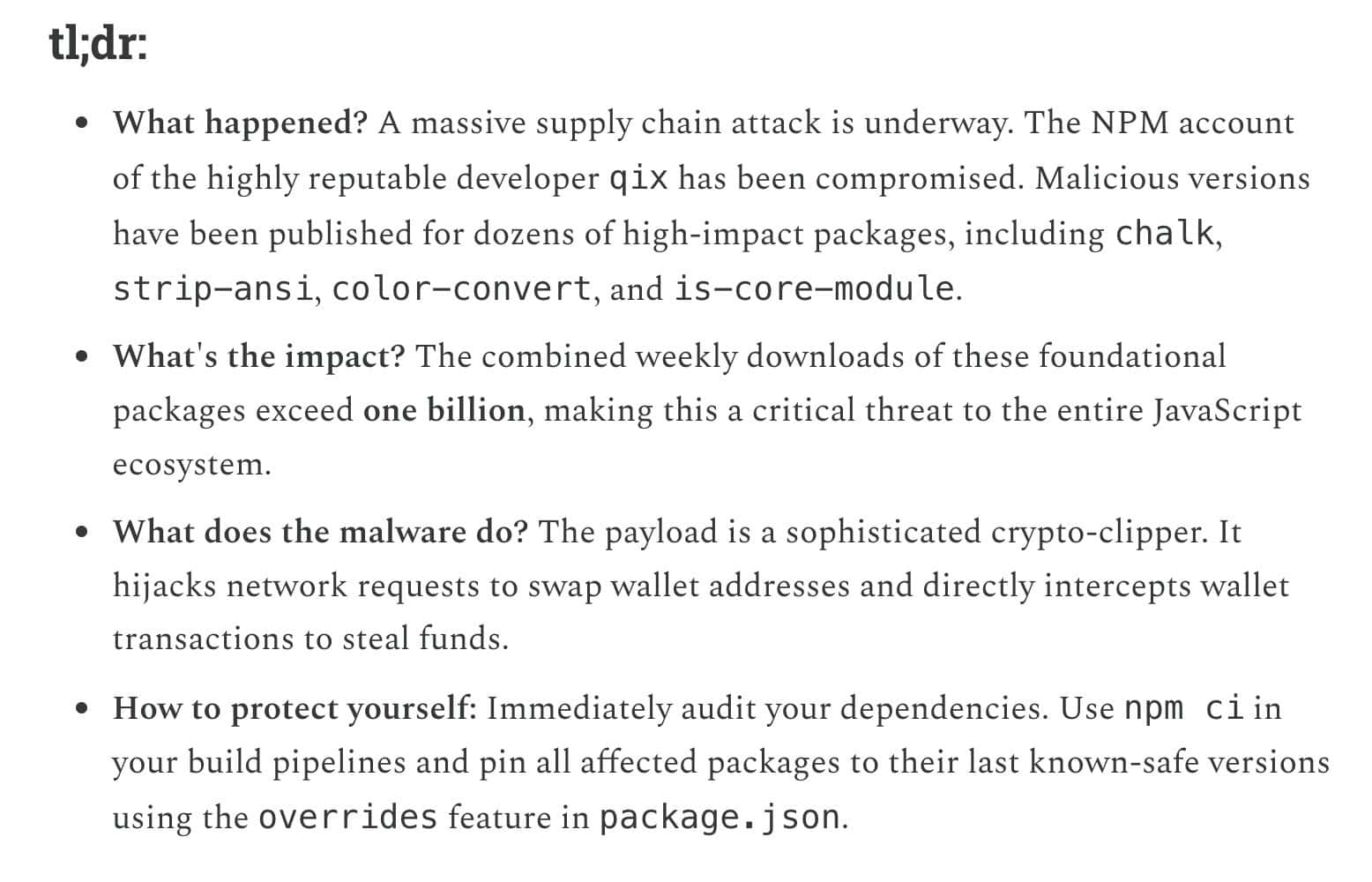The breach hit core JavaScript libraries like chalk, strip-ansi, and color-convert-packages so foundational they’re practically the digital equivalent of plumbing. Together, these libraries are downloaded billions of times every week, quietly running inside everything from web apps to developer tools. Most devs don’t even install them directly-they’re like that one weird cousin who shows up uninvited to family reunions but somehow ends up doing all the dishes. That’s why this attack is basically the software apocalypse. 🌋
What Happened
According to multiple security reports, attackers compromised the NPM account of a well-known developer, slipped malicious code into these libraries, and shipped them straight into the global software bloodstream faster than you can say “blockchain.” The payload? A crypto-clipper-malware that swaps out wallet addresses mid-transaction, silently diverting funds to the attacker. It’s like if someone swapped your Venmo recipient from “Mom” to “Random Guy Named Chad.” 💸
If you’ve ever copied a wallet address, pasted it into a field, and hit “Send,” this is your personal horror movie. The code hijacks the destination address, and unless you manually double-check on a hardware wallet, your funds are gone. Poof. Vanished. Like my motivation on a Monday morning. ☕️

The TLDR from security researchers, source: Observations
Why This Matters
- For crypto users: If you rely on software wallets, you’re exposed. Hardware wallets that force you to physically confirm every transaction remain the gold standard for security. Think of them as the bouncer at a club-annoying but necessary. 🛡️
- For developers: The attack didn’t just compromise apps built by careless coders. It poisoned libraries so fundamental that even the most diligent devs are affected. You don’t have to install these packages directly-your dependencies already did it for you. It’s like finding out your organic kale salad was grown next to a toxic waste dump. 🥶
- For the open-source ecosystem: NPM is basically the app store of the JavaScript world. It’s also a single point of failure. A lone compromised developer account just weaponized code that billions of people indirectly trust. Open-source maintainers deserve medals-or at least hazard pay. 🏆
The Unanswered Questions
It’s still unclear whether the malware goes further-some researchers speculate it might also attempt to steal seed phrases directly. If true, this would elevate the hack from “clipper attack” to “full-on wallet drain.” Imagine waking up to find your crypto life savings gone, replaced with a cryptic message like, “Thanks for the donation!” 😱
It’s another brutal reminder that our entire digital infrastructure rests on volunteer-maintained open-source codebases-often written by one person in their free time. Chalk isn’t glamorous, but it’s everywhere. When attackers compromise something this fundamental, the fallout ripples across the entire internet. It’s like realizing the foundation of your house was built by interns. 🏠
Crypto just happens to be the juiciest target because it’s instant money, no chargebacks, no middleman. But make no mistake: the real crisis is that the global software supply chain is held together with duct tape and trust. And let’s be honest, trust is in short supply these days. Send transactions with caution until this is resolved-or just hide under your bed. Your call. 🛏️
Read More
- Oh, The Drama! Crypto Whales Evacuate as Market Prepares to Shuffle 🌪️
- Will Solfart Fart Its Way to Crypto Fame? 🤔
- Bitcoin ETFs Make It Rain While Ether Buys a One-Way Ticket Out 🪙📉
- Bitcoin Miners Go Green as AI Deals and Bitcoin Surge Create Perfect Storm
- Trump’s Family Buys Wild Amount of Bitcoin Mining Machines?! ASIC Madness!
- 🚀 Stellar Plummets Like a Discworld Turtle Off a Cliff! 🌪️
- LINK Soars 20%-Will It Reach $100? 🚀📈
- Bitcoin Mania: Health Firm Goes Full Crypto! 🚀
- The Grand Melancholy of Crypto: A Tale of Greed, Fear, and Foolish Hope
- Is Hyperliquid About to Explode? (Spoiler: Probably Not) 🔥
2025-09-08 22:10